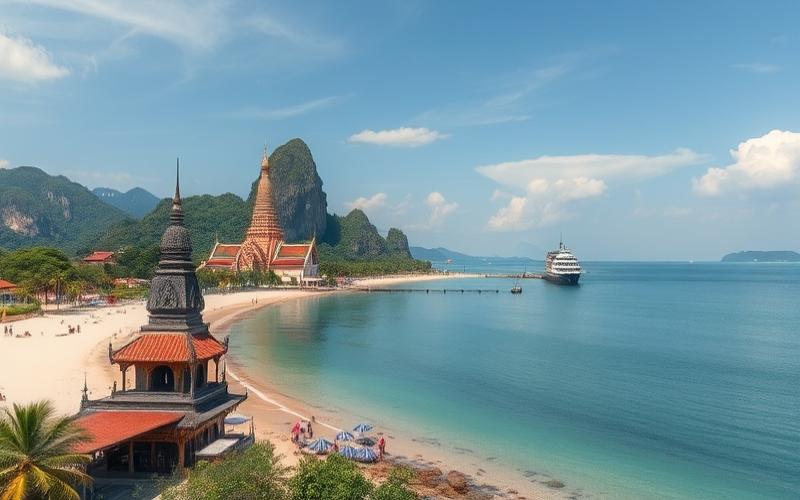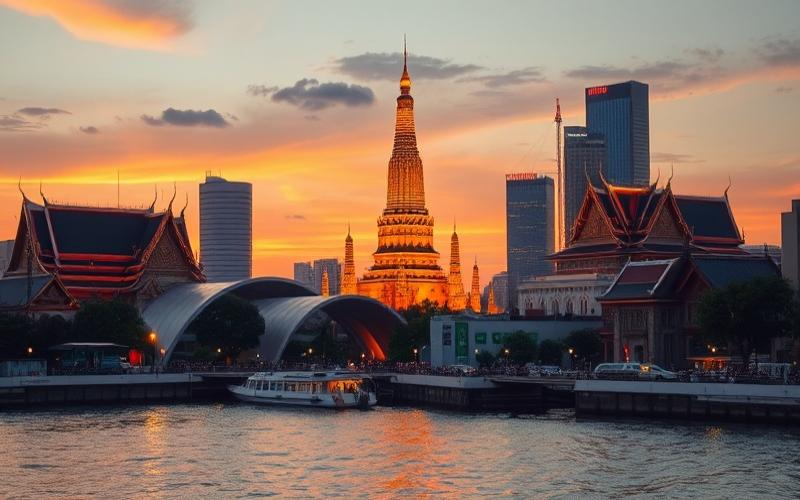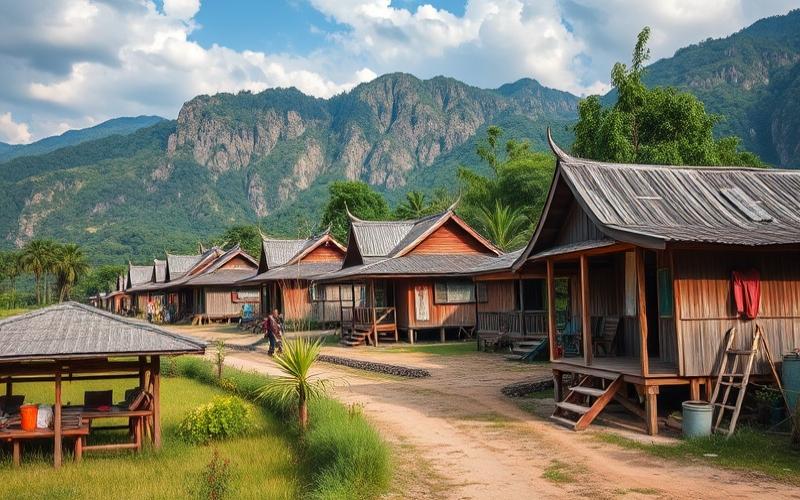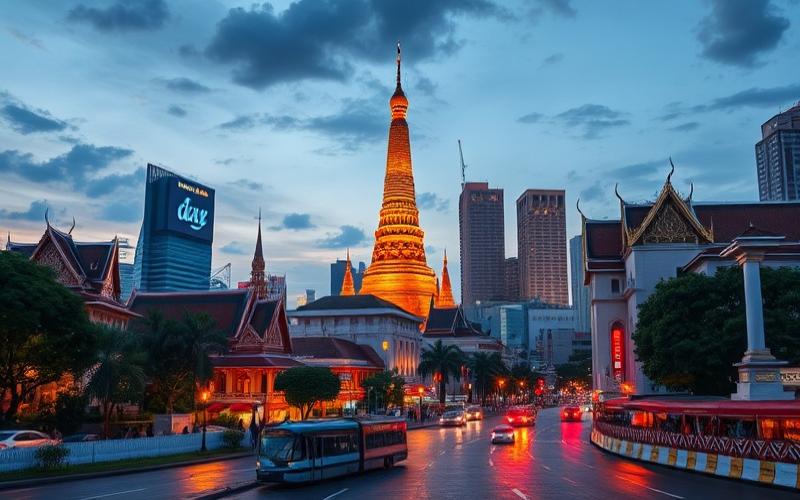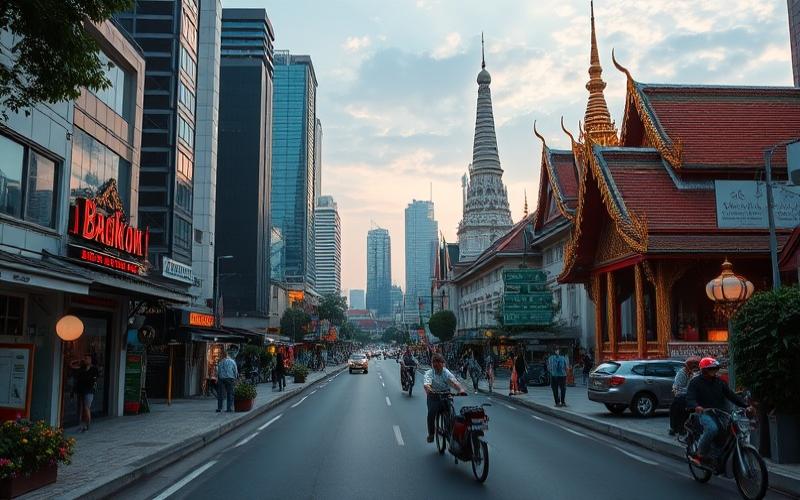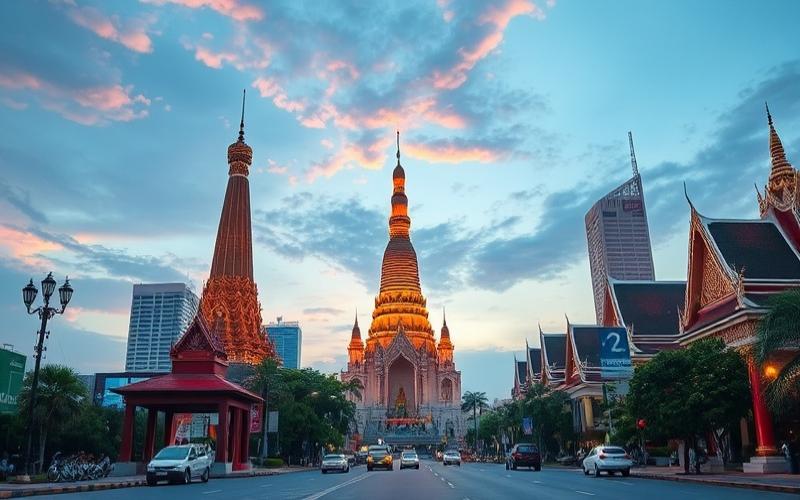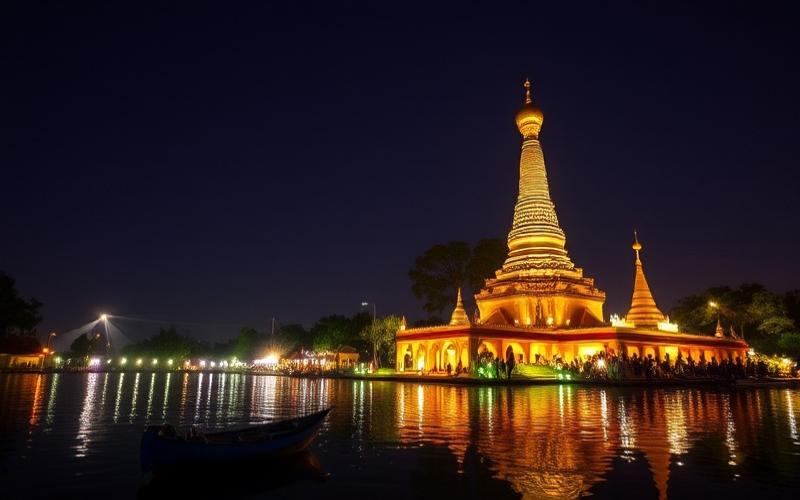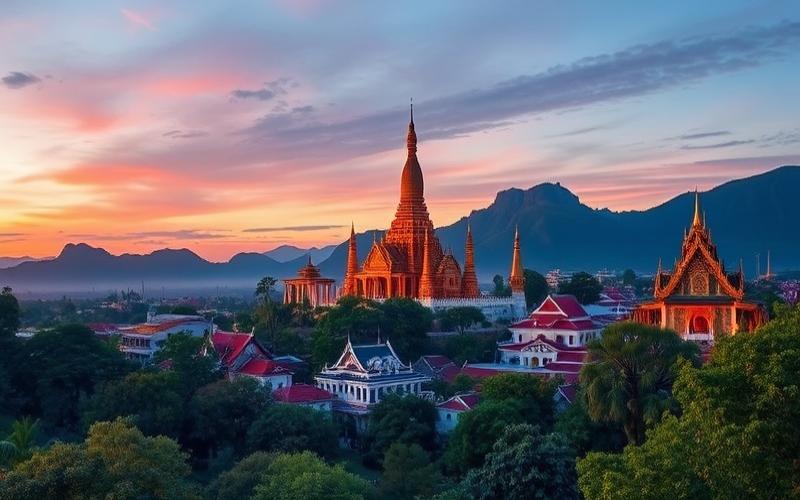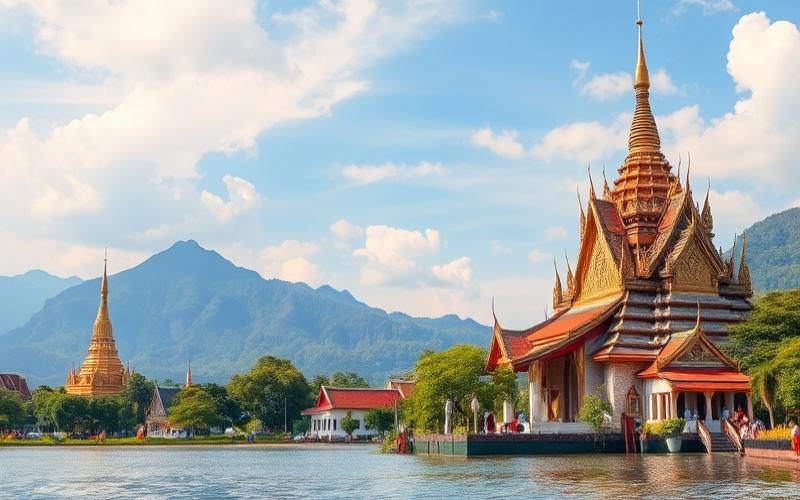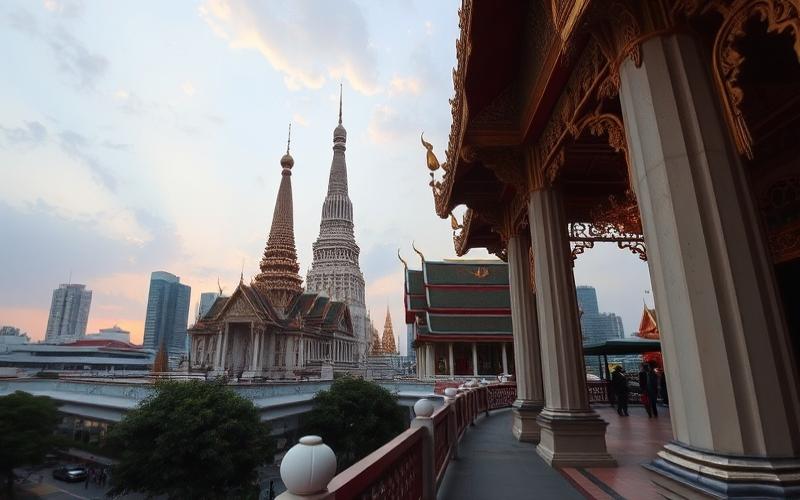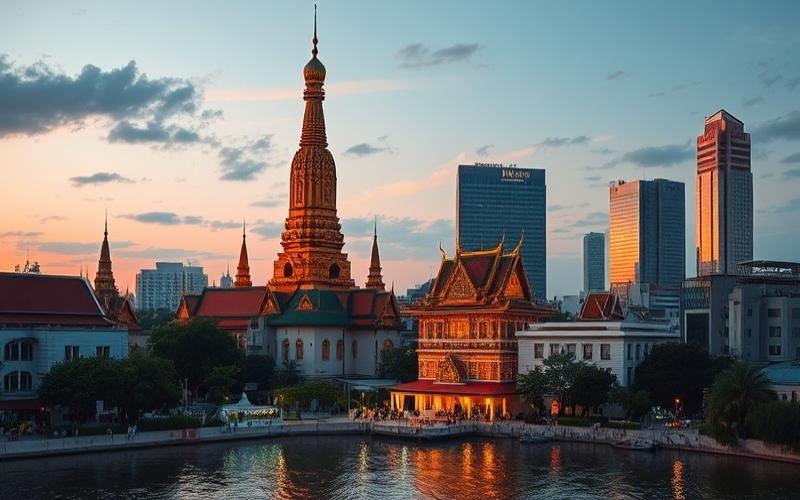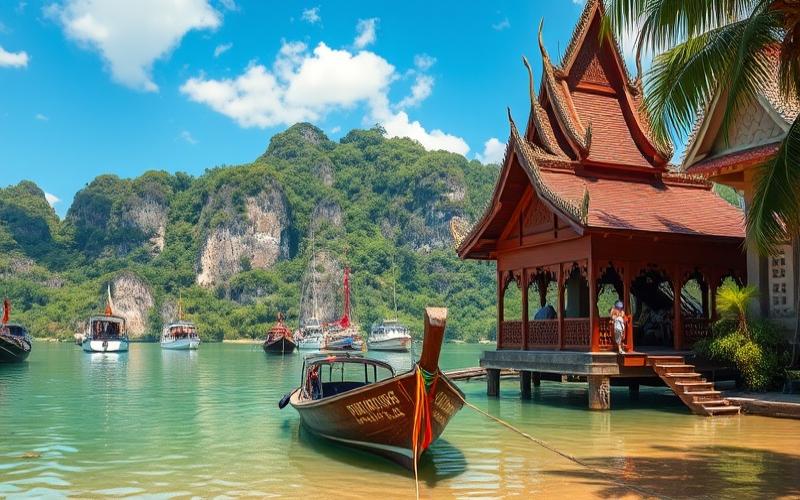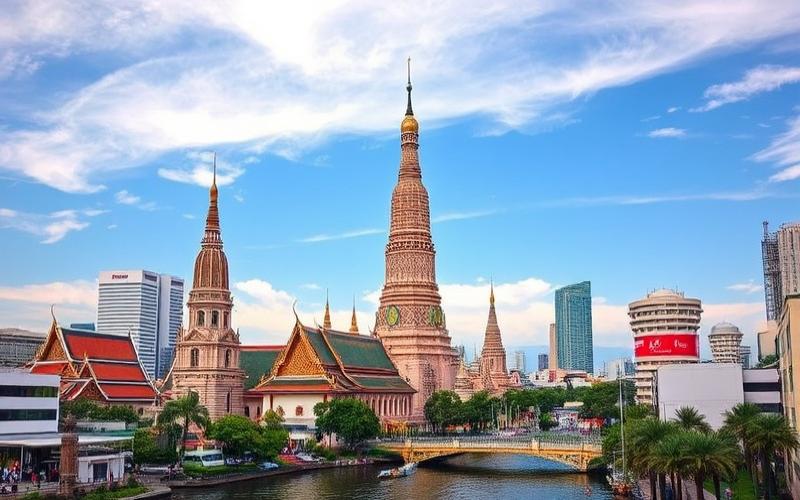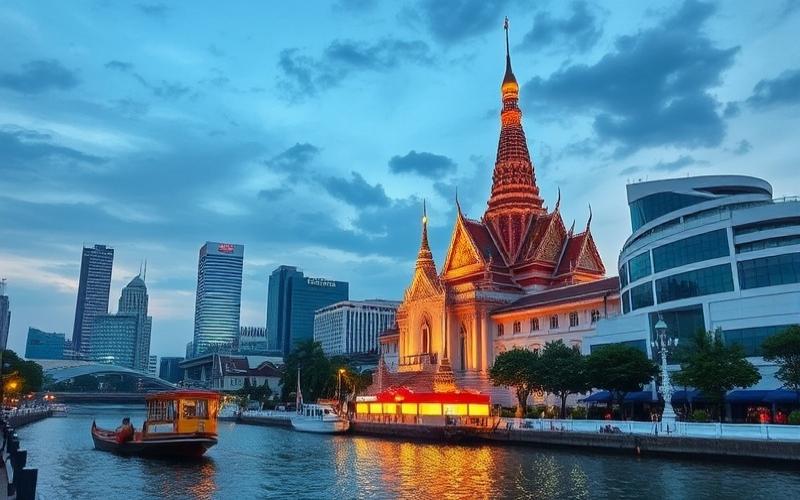
 Published on and written by Cyril Jarnias
Published on and written by Cyril Jarnias
At the heart of Thailand, a country experiencing rapid economic and cultural growth, an innovative real estate phenomenon is gaining increasing attention: co-living spaces. These shared spaces are revolutionizing how people live and interact, addressing new needs for flexibility and community in an increasingly interconnected world.
Between architectural innovation and social connectivity, discover how this vibrant lifestyle is reinventing traditional housing norms and establishing itself as an attractive choice for young professionals and international students seeking a balance between privacy and social interaction.
The Development of Co-living Spaces in Thailand: A Rising Trend Among Youth
Co-living spaces are experiencing significant growth in Thailand, particularly among young professionals and digital nomads. This phenomenon can be explained by a combination of economic, social, and cultural factors that meet contemporary needs for flexibility, accessibility, and community living.
Economic Factors
- Reduced urban living costs: Co-living rents are generally lower than those for private apartments, with rates starting from 8,000 THB per month in Bangkok and even less in Chiang Mai.
- All-inclusive packages: Utilities (Wi-Fi, cleaning) are included in the monthly rent.
- No long-term commitment: No need for a high deposit or annual contract; monthly rentals are preferred.
Social Factors
- Search for community: These spaces encourage exchanges among residents through the presence of common areas (shared kitchens, collaborative lounges).
- Dedicated networking programs and social events, tailored for young entrepreneurs or freelancers.
- Cross-cultural encounters, facilitating integration for expatriates or newcomers.
Cultural Factors
Rise of remote work and flexible jobs post-pandemic.
Preference for sharing over individual ownership among millennials.
| Factor | Description |
| Economic | Affordable rent; all-inclusive packages; flexible contracts |
| Social | Common spaces; networking; collaborative atmosphere |
| Cultural | Remote work; professional mobility; community spirit |
List of cities where this trend is prominent:
- Bangkok
- Chiang Mai
- Phuket
These cities offer:
- A high concentration of expatriates
- Entrepreneurial dynamism
- Infrastructure suited to hybrid work/social life modes
Concrete examples of recent initiatives:
Projects led by AP Thai, Sansiri, or Origin Property now include modular spaces that can be transformed into offices/relaxation zones according to residents’ needs.
Notable initiatives:
- Fully furnished spaces with integrated coworking access
- Implementation of regular community activities (workshops, themed parties)
- Eco-friendly systems promoting sustainable practices
In summary:
The growing popularity of co-living in Thailand is based on its ability to offer a flexible and economical solution that meets the social and professional expectations of younger generations. These spaces embody a new urban lifestyle focused on sharing, mutual support, and adaptability in the face of modern labor market changes.
Good to know:
In Thailand, co-living spaces are developing rapidly, particularly attracting young people due to several economic and social factors. With the rising cost of living and increasing job flexibility due to remote work, these spaces offer a practical and economical solution, especially in cities like Bangkok and Chiang Mai, which are at the forefront of this trend. Co-living spaces meet the desires of young people seeking community and sharing by offering shared living and working environments that foster social interactions. Recent projects such as Hubba-Station in Bangkok exemplify this trend, blending living, coworking, and relaxation spaces, illustrating how these initiatives adapt to the contemporary needs of mobile young professionals.
Upscale co-living in Thailand represents a new generation of co-living spaces that meet the high expectations of international professionals and expatriates seeking comfort, connectivity, and community.
Main characteristics of upscale co-living in Thailand:
- Luxury amenities:
- Infinity pools and hot tubs
- Gyms and wellness spaces (yoga, massage, spa)
- Designer common areas (lounges, panoramic terraces, rooftops)
- Concierge services, 24/7 security, hotel-style maintenance
- High-end shared kitchens and private movie theaters
- Collaborative workspaces:
- Equipped offices and integrated meeting rooms
- High-speed internet, printers, and professional equipment
- Lounge areas for networking and community events
- Strategic locations:
- Immediate proximity to business centers, transportation (BTS/MRT in Bangkok), restaurants, shopping malls, and cultural spaces
- Dynamic neighborhoods (Sukhumvit, Silom in Bangkok; Nimman in Chiang Mai; Patong and Bang Tao in Phuket)
Adaptation to the modern co-living concept:
- Blend of privacy (suites with private bathrooms, soundproofing) and shared living (large common areas, organized activities)
- Contemporary interior design, noble materials, meticulous finishes
- Flexibility in stay durations (from short-term to long-term)
- International community fostering cultural and professional exchanges
Attractiveness factors for professionals and expatriates:
- Comfort and hotel-standard luxury at a lower cost than traditional individual rentals of the same caliber
- Immediate access to a social and professional network, ideal for digital nomads, entrepreneurs, and mobile executives
- Optimized value for money with included services
- Security and peace of mind in the residential environment
| City | Examples of notable developments | Special features |
|---|---|---|
| Bangkok | Scope Thonglor, The Lofts Asoke, The Base Sukhumvit | Luxury condos, integrated coworking, BTS access, premium services |
| Chiang Mai | LIV@Nimman, The Astra | Collaborative spaces, international ambiance, proximity to universities and tech hubs |
| Phuket | Kata Rocks, Malaiwana Residences, Beachfront Villas | Prestige villas, sea views, relaxation and coworking spaces, direct beach access |
- Reduced urban living costs (shared expenses, pooled services)
- Access to high-end infrastructure without initial investment
- Development of an immediate professional and friendly network
- Rental flexibility suited to international mobility
- Immersive experience of local culture with international standard comfort
Thai upscale co-living spaces are reinventing the shared living model by combining luxury amenities, urban connectivity, and community spirit, perfectly meeting the demands of modern residents.
Good to know:
Upscale co-living in Thailand, particularly in cities like Bangkok, Chiang Mai, and Phuket, embodies the modern essence of co-living spaces by combining comfort, practicality, and community. Especially attracting professionals and expatriates, these spaces offer luxury amenities such as pools, gyms, and relaxation areas, while integrating shared offices that facilitate remote work. Their strategic locations near major urban attractions and public transportation make them a popular choice. These developments, like those of Ascott Sathorn in Bangkok, allow residents to benefit from an enriching community life and reduce the costs typically associated with upscale individual housing. The adoption of mobile applications for service management extends the shared living experience while promoting social and professional connections, thus illustrating a successful adaptation of the traditional co-living model to modern needs.
The digitalization of co-living spaces in Thailand has profoundly transformed how residents interact and build their sense of belonging. Thanks to innovative digital initiatives, these places now foster the creation of dynamic and connected communities.
Digital platforms used in co-living spaces
- Proprietary mobile applications: Many spaces, such as Alt Coliving in Chiang Mai, provide an internal app allowing residents to register for events, exchange via a community chat, and access the activity calendar.
- Private groups on Facebook or Slack/Discord: These groups serve to organize virtual workshops (yoga, personal development), coordinate local outings, or share practical tips among members.
- Interactive digital boards (smart boards) in common areas to display the weekly agenda and allow collaborative addition of activity proposals.
- Specialized platforms for events, such as Meetup or Eventbrite localized for the co-living community.
Concrete examples of spaces that have successfully digitalized their community
| Space | Location | Key digital initiatives |
|---|---|---|
| KoHub | Koh Lanta | Internal app + private forum; weekly organization via app |
| Alt Coliving | Chiang Mai | Dedicated platform for internal announcements & event management |
| Outpost | Bangkok | Thematic Slack groups + regular webinars |
Integrated innovative technologies
- Secure high-speed Wi-Fi throughout the site, essential for collaborative work and common video conferences.
- Connected home automation systems (smartphone access, room booking).
- Immersive spaces with augmented reality during virtual themed workshops.
Impact on daily life and sense of belonging
Benefits felt by residents:
- Easier access to real-time community information
- Rapid creation of social links thanks to asynchronous discussions
- Increased participation thanks to hybrid format (in-person/virtual)
- Better inclusion for those who travel frequently or work off-site
General sentiment expressed by members:
“I feel at home as soon as I arrive because I can already interact with my future roommates even before moving in.”
“Shared online workshops allowed me to create a real professional network while remaining flexible.”
Synthesized list of digital uses:
- Automatic organization of chore sharing via dedicated apps
- Shared calendar accessible from mobile
- Professional workshops broadcast simultaneously online/offline
- Internal forums for local recommendations
The deep integration of digital technology in these places is giving rise to a new form of community where each resident can actively participate according to their desires and availability. The result is a strong collective feeling despite the cultural diversity inherent to Thai shared spaces.
Good to know:
In Thailand, shared spaces leverage the potential of digital technology to strengthen community bonds among residents. Platforms like Meetup and Discord are commonly used to organize events such as themed dinners, online yoga sessions, and creative workshops, thus fostering social interaction even at a distance. Notable examples include Hubba, a co-living space based in Bangkok, which offers online forums for daily exchanges and mutual aid, or The Work Loft, which integrates community management applications facilitating the booking of common spaces and participation in specific discussions. These digital initiatives not only increase the sense of belonging but also enrich residents’ quality of life by promoting an interactive and supportive environment. The digitalization in Thai co-living spaces thus has a significant impact, offering increased connectivity and a supportive community.
Disclaimer: The information provided on this website is for informational purposes only and does not constitute financial, legal, or professional advice. We encourage you to consult qualified experts before making any investment, real estate, or expatriation decisions. Although we strive to maintain up-to-date and accurate information, we do not guarantee the completeness, accuracy, or timeliness of the proposed content. As investment and expatriation involve risks, we disclaim any liability for potential losses or damages arising from the use of this site. Your use of this site confirms your acceptance of these terms and your understanding of the associated risks.






